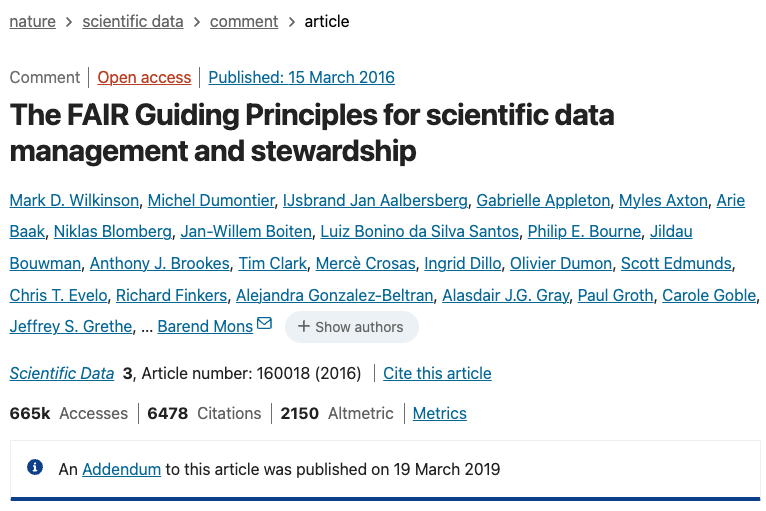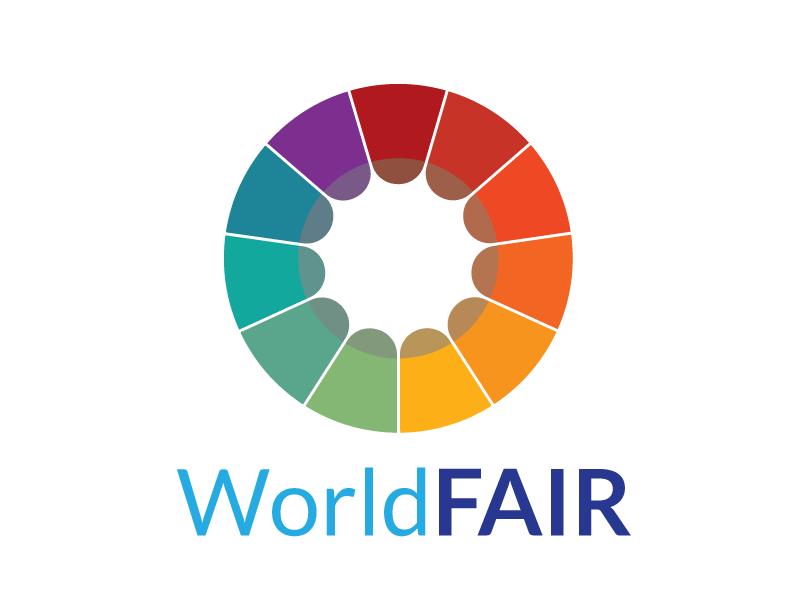The FAIR Principles#
Introduction#
FAIR stands for Findable, Accessible, Interoperable, and Reusable, representing a set of widely agreed principles for data management, sharing, and reuse across various domains.
Findability encapsulates the notion that data should be easily discoverable by both humans and machines.
Accessibility ensures that once data is found, it can be accessed, be it through open or controlled means, ensuring inclusivity and transparency in data availability.
Interoperability focuses on the seamless interaction between different systems, enabling data exchange and integration across various platforms and domains.
Lastly, Reusability emphasizes the importance of ensuring that once accessed, data can be effectively reused for various purposes, maximizing its value and potential.
These principles are not just theoretical concepts; they form a guiding framework, influencing data management practices, technological advancements, and policy implementations worldwide. By adhering to the FAIR principles, data becomes more than just information—it becomes a catalyst for innovation, collaboration, and informed decision-making.
The FAIR Guiding Principles#
Findability
To be Findable:
F1. (meta)data are assigned a
globally unique and persistent identifier
F2. data are described with
rich metadata(defined by R1 below)
F3. metadata
clearly and explicitly include the identifier of the data it describes
F4. (meta)data are registered or
indexed in a searchable resource
Accessibility
To be Accessible:
A1. (meta)data are retrievable by their identifier using a
standardized communications protocolA1.1 the protocol is
open, free, and universally implementableA1.2 the protocol allows for an
authentication and authorization procedure, where necessary
A2.
metadata are accessible, even when the data are no longer available
Interoperability
To be Interoperable:
I1. (meta)data use a
formal, accessible, shared, and broadly applicable language for knowledge representation.
I2. (meta)data use
vocabularies that follow FAIR principles
I3. (meta)data include
qualified references to other (meta)data
Reusability
To be Reusable:
R1. meta(data) are
richly described with a plurality of accurate and relevant attributesR1.1. (meta)data are released with a
clear and accessible data usage licenseR1.2. (meta)data are associated with detailed provenance
R1.3. (meta)data meet domain-relevant
community standards

Fig. 1 The FAIR Principles the cover pages for the FAIR principle articles as published in Scientific Data. https://doi.org/10.1038/sdata.2016.18, [WDA+16].#
Additional resources#
GoFAIR: is a bottom-up, stakeholder-driven and self-governed initiative that aims to implement the FAIR data principles, making data Findable, Accessible, Interoperable and Reusable (FAIR)
The FAIR Cookbook for FAIR doers: An online, open and live resource for the Life Sciences with recipes that help you to make and keep data Findable, Accessible, Interoperable and Reusable; in one word FAIR.
References#
- WDA+16
Mark D. Wilkinson, Michel Dumontier, I Jsbrand Jan Aalbersberg, Gabrielle Appleton, Myles Axton, Arie Baak, Niklas Blomberg, Jan-Willem Boiten, Luiz Bonino da Silva Santos, Philip E. Bourne, Jildau Bouwman, Anthony J. Brookes, Tim Clark, Mercè Crosas, Ingrid Dillo, Olivier Dumon, Scott Edmunds, Chris T. Evelo, Richard Finkers, Alejandra Gonzalez-Beltran, Alasdair J. G. Gray, Paul Groth, Carole Goble, Jeffrey S. Grethe, Jaap Heringa, Peter A. C. Hoen, Rob Hooft, Tobias Kuhn, Ruben Kok, Joost Kok, Scott J. Lusher, Maryann E. Martone, Albert Mons, Abel L. Packer, Bengt Persson, Philippe Rocca-Serra, Marco Roos, Rene van Schaik, Susanna-Assunta Sansone, Erik Schultes, Thierry Sengstag, Ted Slater, George Strawn, Morris A. Swertz, Mark Thompson, Johan van der Lei, Erik vanMulligen, Jan Velterop, Andra Waagmeester, Peter Wittenburg, Katherine Wolstencroft, Jun Zhao, and Barend Mons. The FAIR Guiding Principles for scientific data management and stewardship. Scientific Data, 3(1):160018, 2016. URL: doi:10.1038/sdata.2016.18 (visited on 2020-09-02).
